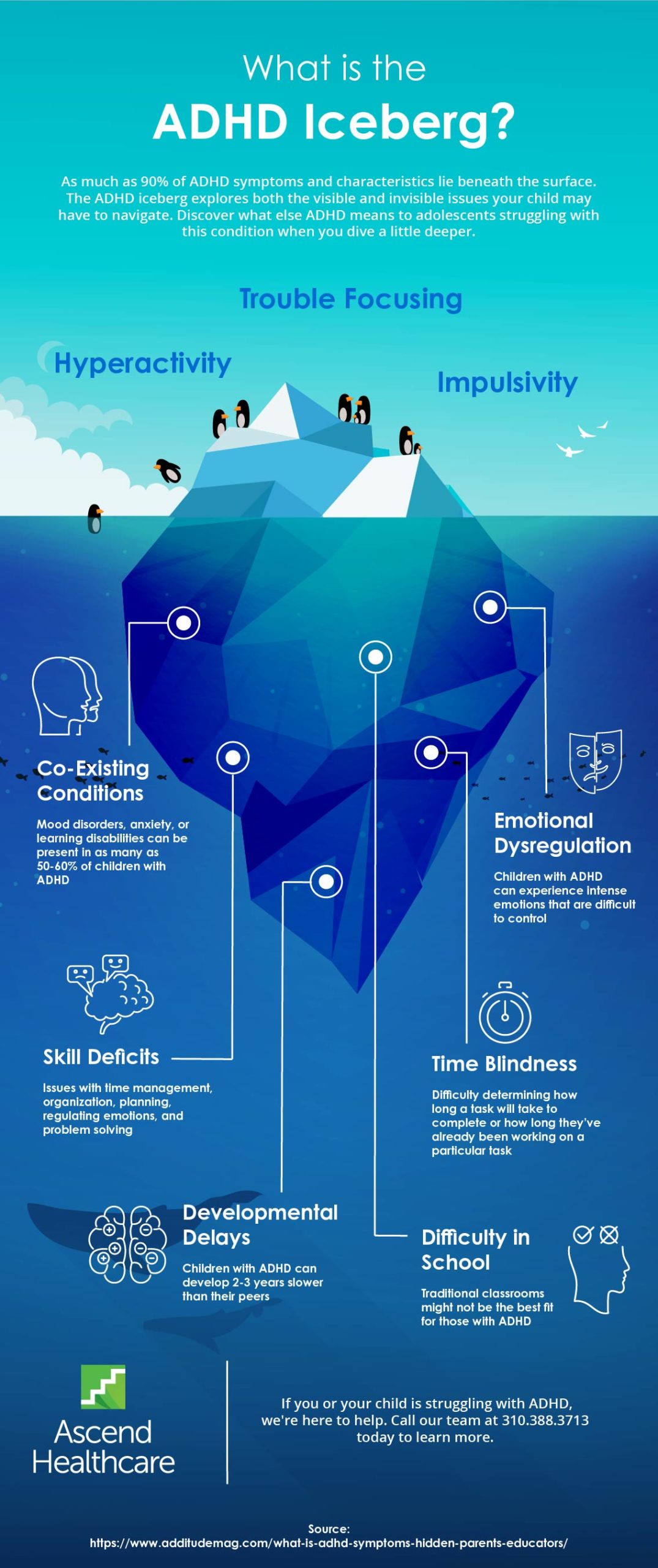
Many people associate ADHD with impulsiveness, hyperactivity, and inattention. While these symptoms are the hallmarks of ADHD, they don’t reveal the entirety of the struggle. There are times when those hidden symptoms are misread as character flaws or personality defects instead of what they truly are — the hidden layers of ADHD. Understanding ADHD symptoms and the phenomenon of the ADHD iceberg can help you figure out how to best help yourself or your child when they’re struggling with ADHD.
If you want to learn more about teens with ADHD symptoms, Ascend has the facts here.
The ADHD Iceberg
Many mental health professionals use the analogy of an iceberg to describe ADHD because its formation is so similar to how this diagnosis impacts an individual. Because most of the iceberg lies beneath the surface of the water, it illustrates how ADHD symptoms can be similarly hidden. Sometimes, 90% of an iceberg is invisible – exactly like the non-obvious symptoms of ADHD. Any child diagnosed with ADHD may not be showing obvious signs of their symptoms, but they could still be struggling.
Your child’s teachers may have pointed out hyperactivity and inattention throughout their time in school. However, these symptoms are only the tip of the ADHD iceberg.
Below the surface of ADHD can lie a variety of symptoms. These might include:
- Developmental delays – Your teen with ADHD symptoms might struggle in school or social situations due to slower development.
- Issues with emotional regulation – ADHD can impact how your teen works through challenging emotions.
- Co-occurring disorders – Teens with ADHD are more likely to struggle with co-occurring conditions such as mood disorders or learning disabilities.
- Poor self-esteem – ADHD can harm a child’s burgeoning self-confidence as they mature.
These ADHD symptoms can go unnoticed by adults, but they can significantly impact a child.
Executive Functioning & ADHD
Executive functioning disorder is another symptom that lurks beneath the surface of the ADHD iceberg. It has to do with how individuals take care of and organize day-to-day tasks. Executive functioning can involve time management, starting tasks as necessary, regulating emotions throughout the day, and planning ahead. Without these skills, teens with ADHD may struggle.
In addition, issues with executive functioning can contribute to depression and anxiety, as teens grapple with seemingly simple tasks when compared to their peers. Lagging behind on responsibilities or struggling at school can lead some teens to develop feelings of hopelessness, worry, or despair.
Understanding ADHD symptoms and the ADHD iceberg is crucial to intervening as soon as possible. Healthy coping skills, like identifying and managing their symptoms, can be an essential tool for anyone with ADHD. Many residential treatment programs even help teens with ADHD develop executive functioning skills like time management and emotional regulation through one-on-one therapy and experiential therapy.
ADHD Treatment at Ascend Healthcare
Teens who have been diagnosed with ADHD might struggle with behavioral issues or their performance in school. Even more concerning, the risk-taking tendencies associated with ADHD can lead some teens to use drugs or alcohol, leading to dependency and substance abuse.
Ascend Healthcare offers an ADHD treatment program at our residential treatment center in Magnolia. Here, teens participate in both clinical and experiential therapies as part of our comprehensive curriculum. If your teen is struggling with their ADHD diagnosis, we can help them understand their disorder and teach them the skills they need to reach their full potential.
If you’re ready to learn more about the residential ADHD program at Ascend, reach out to our team today at 310.388.3713 or connect with us online.






